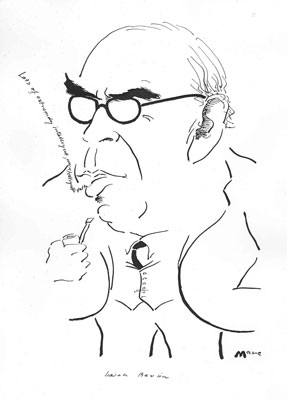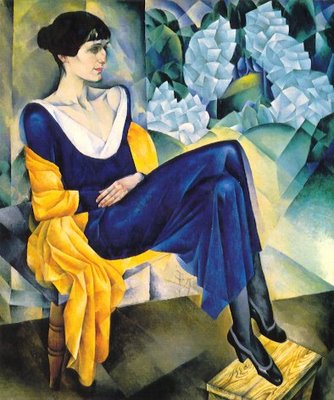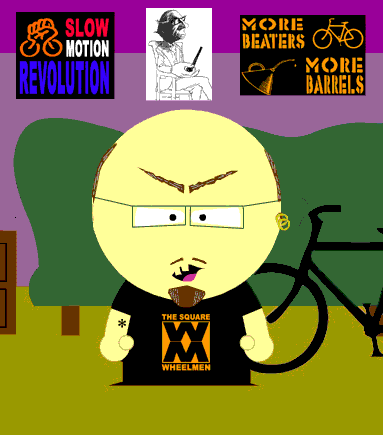More on Akhmatova
and Isaiah Berlin
 I've been in poetical mood these last few days. So bear with me. I'm not the only one who has spent a sleepless night or two reading the bards. And this is what I read about several years ago: a clandestine Moscow meeting between Isaiah Berlin and his intellectual paramour, the great Russian poet, Anna Akhmatova.
I've been in poetical mood these last few days. So bear with me. I'm not the only one who has spent a sleepless night or two reading the bards. And this is what I read about several years ago: a clandestine Moscow meeting between Isaiah Berlin and his intellectual paramour, the great Russian poet, Anna Akhmatova. Yes, yes. I go on and on about him. Berlin, I read to understand; but Akhmatova I read to survive. And crazy indeed, they both met one fateful night just at the end of WWII in Leningrad, now St. Petersburg ... again. For just one short evening: no sex, maybe flirtation, just talk. Well, that's what they said at least. Nobody knows for sure. But every one wonders what exactly happened like John Stallworthy.
Yes, yes. I go on and on about him. Berlin, I read to understand; but Akhmatova I read to survive. And crazy indeed, they both met one fateful night just at the end of WWII in Leningrad, now St. Petersburg ... again. For just one short evening: no sex, maybe flirtation, just talk. Well, that's what they said at least. Nobody knows for sure. But every one wonders what exactly happened like John Stallworthy.a triptych
1940-1988
Leningrad-Tashkent-
Moscow-Oxford
1
Foreword
In November 1945, Isaiah Berlin, then First Secretary at the
British Embassy in Moscow, was visiting Leningrad and learnt
from a conversation in a bookshop that Anna Akhmatova was
living nearby. Telephoned, she invited him to call at her flat in the
old Fontanny Palace on the Fontanka.
Their meeting that afternoon was interrupted, as he describes in his Personal Impressions:
‘Suddenly I heard what sounded like my first name being shouted somewhere outside.
I ignored this for a while - it was plainly an illusion - but the shouting became louder
and the word "Isaiah" could be clearly heard. I went to the window and looked out,
and saw a man whom I recognized as Randolph Churchill. He was standing in the
middle of the great court, looking like a tipsy undergraduate, and screaming my name.'
Berlin hurriedly led him away, but himself returned that evening to continue his
conversation with the poet.
They talked all night of their respective Russian childhoods, of such of her early
friends as Modigliani and Salomé Andronikova, of the war, of Tolstoy,
of what she had written - and read him - of ‘Poem without a Hero'.
In the small hours of the morning they were joined by her son, Lev Gumilev,
bringing the only food they had in the flat.
This meeting, because of Churchill's interruption, came to Stalin's attention
(‘So our nun is receiving visits from foreign spies'), altering the course of
Akhmatova's life and, she believed, the course of history. She became
convinced that, fuelling Stalin's paranoia, they had caused the
first move in the Cold War.
Berlin came to say goodbye to her, before leaving the Soviet
Union, on 5 January 1946. The next day, uniformed men screwed
a microphone into her ceiling. That summer she was denounced
by the Central Committee of the Communist Party and expelled
from the Writers' Union.
On 6 November 1949, her son Lev was arrested for the third time and
the following day Akhmatova committed her poems finally to memory
before burning their manuscripts; among them, the completed
‘Poem without a Hero' in which Berlin appears as ‘The Guest from the Future'.
2
The doorbell a tocsin tolling
as if the Huns were at the gate
told nothing that was not foretold
in this room and on this date
when the stranger turned left from the bridge
along the Fontanka and knew
the gates by the iron lions
that growled and let him through
Who shadowed him Lachesis
the Eumenides knowing what now
I know and do not know where they
have taken you and if But how
gladly I heard his step
on the stair his touch on the bell
as shy as a boy's fingertip
touching his first girl
He brought me no lilac no ring
but something more precious than love
As the terrible downpour ceased
he brought me like Noah's dove
a green word out of the blue
A Russian bird rinsing the air
of its thunder and ash and if
he flew off he returned later
and Europe again put out her leaves
behind my Amedeo's head
the drawing on his knee my wall
Modigliani famous dead
He brought me leaves and he brought
me stone He brought me Salomé
back from the dim pharaonic vault
of the Stray Dog cabaret
and up it seemed the deeper stairs
those others had descended who
as memory turned the key
came at her shadow trooping through
the hall to meet the guest whom I
admitted to the Masquerade
when destiny called the tune
But whose was the tune I played
the music to which we moved
in the candlelight pouring wine
dividing between us the clutch
of potatoes your hand and mine
and his hand with a cigar
conducting Something by Mozart
Donna Anna dreams a dream
Footsteps and the dreams depart
He brought me leaves and he brought
me stone a guest of stone
to drag you from the candlelight
Now Donna Anna sits alone
and will do what must be done
if you in some cage tonight
are to lie beyond the range
of the poem's fatal flight
Let it be lettered in flame
translated into air
to be printed and reprinted
anytime anywhere
under roof or under stars
on the one press that survives
the listeners the watchers
the searchers with their knives.
3
From the year 1940 I look
As if down from a tower on it all,
As if I were taking leave again
Of all I look leave of long ago,
As if I had made the sign of the cross
And went to the vaults below.
25 August 1941
Leningrad under siege
New Year's Eve. The Fontanny Palace. Instead
of the man expected, shades of 1913 appear to
the author in the shape of mummers. A white hall
of mirrors. Lyrical digression: the Guest from
the Future. A Masquerade. A Poet. A Ghost.
I have lit my sacred candles
To halo the New Year,
And I welcome 1941
With you who do not appear.
Good God!
The flames drown in crystal
‘And the wine like poison burns'.
Rough shards of speech resurface
And old hysteria returns
And the clock still does not strike . . .
In mounting anxiety
Like a shadow on the threshold
I guard my sanctuary.
I hear a bell's insistent ring
And feel my blood run colder,
And turned to stone, ice, fire,
I look over my shoulder
As if remembering something,
And in a low voice say:
‘I'm sorry. The Doges' Palace
Is next door, but today
You might as well leave all
Your masks and cloaks, your crowns
And scepters in the hall.
I've a mind to sing your praises,
New Year's Eve hell-raisers.'
Here is Faust, and here Don Juan,
Dapertutto, Iokanaan,
And here the Nordic Glahn,
Or the murderer Dorian,
All of them whispering
To their Dianas some
Old Story. One has brought
A Bacchante with a drum.
And the walls have opened for them,
Light has erupted, sirens wail,
The ceiling swells to a dome.
As if scandal could make me quail . . .
What to me are Hamlet's garters!
Or the dance of Salomé
Or the Man in the Iron Mask!
I am more iron than they . . .
And whose turn now to be afraid,
To back away, wince guiltily,
And ask forgiveness for old sins?
I see:
What do they want, but me?
Supper was not laid for them,
And our worlds are not the same.
Those coat-tails conceal a tail . . .
How elegant he is, how lame . . .
But . . . surely you have not dared
To bring the Prince of Darkness here?
That face or mask or skull
Displays an anguished sneer
That only Goya would dare paint.
Prince Charming, Prince Derision -
Compared with whom, the worst
Of sinners is a saint . . .
On with the carnival!
But why am I alone alive?
Tomorrow morning I shall wake
And no indictments will arrive,
And the blue beyond my windows
Will laugh into my face.
But I am frightened; shall go in
Hugging my shawl, my lace,
Smile at them all and say nothing.
I do not want to meet again
This side of Jehosophat
The woman that I was then
In a necklace of black agate.
Can the Last Day be here . . . ?
I have forgotten your lessons,
False prophets of yesteryear,
But you have not forgotten me.
The future in the past draws breath
As the past in the future rots -
Dead leaves in a dance of death.
The sound of invisible feet,
Cigar smoke blue in the air
Over a parquet floor,
And in all the mirrors there
The man who did not appear
And could not enter that hall.
A man much the same as the rest,
The grave had not made his flesh crawl
And there is warmth in his hand -
My Guest from the Future - a light
In his eye. Will he really come,
Turning left from the bridge, tonight?
4
Tonight and every night the bell
the stove and the candles burn
Before the tocsin tolls again
hell-raisers must return
The stove window reddens
with a city in flames
redoubled in a river
the Moskvá Nevá Thames
debouching into Phlegethon
I saw there some up to their eyes in blood
and the great centaur told me These are the tyrants
who from mass-murder made a livelihood
They choke in the smoking torrents
from springs they unstopped themselves
Napoleon is treading blood
the vintage of 1812
That swastika forelock signals
dreams of a higher race
The blood of jews and gypsies
accuses him to his face
and there is the Children's Friend
islanded in midstream
eyelids moustache encrusted
but that is not his scream
Great centaur shaper of war and peace
what of your argument
that power is the people's will
transferred with their consent
to him and him and him Because
you legitimate their claims
you do your sentry duty
in this abyss of flames
I have called you too a monster
and hated you with all my heart
but in the night of history
you played a homeric part
Under the comet's peacock tail
your city like Homer's Troy
is still an active volcano
a city flame cannot destroy
a torch by whose shuddering light
you show me what you were shown
a road a blizzard prisoners
turned in their sleep to stone
Great centaur I thought of you
and the prisoners I thought of them
in the line that shuffled towards
my smouldering Requiem
And so it begins again
the snow starting to fall
At a darkened window I look
as if down from a tower on it all
as if I were taking leave again
of all I took leave of long ago
my son dragged out by a stone guest
a pattern without purpose No
The pattern must be the shadow
of purpose by which I know
that my Guest from the Future turned
left from the bridge because Clio
dictated it she who dictated
the lines on a page of snow
in a wind too cold to let
the tears it loosened flow
preserving them for a future
the past may no longer rot
when spring winds can bear witness
to what the chronicles do not
Labels: history, Isaiah Berlin, kunst, pensées, worldbeat







0 Comments:
Post a Comment
<< Home